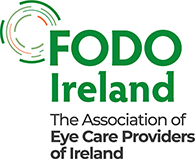20 October 2020
Member update: Level 5 alert
We have continued to monitor COVID-19 data and the alert level and are writing to update you about new guidance issued since yesterday evening.
On 14 October, the Department of the Taoiseach confirmed that dispensing opticians, optometrists and audiologists provide essential services and would remain classified as essential retail throughout Level 4 which we supported. We did not issue a member alert at the time as eye care services were unaffected by the news.
Yesterday evening, a Level 5 alert was issued updating the essential retail list to continue to include opticians and optometrists (and audiologists services) but restricting specific retail activities to be provided on “an emergency basis only”. It is, however, important to read this in context of the essential services list, which was updated today, and states:
- “services provided by a member of a designated profession within the meaning of section 3 of the Health and Social Care Professionals Act 2005 (No. 27 of 2005)” are essentials services. As we set out in our 14 April update this means optometrists/opticians practices are classified as essential services and optometrists/opticians are essential workers providing essential services
- that retail trade of “medical devices or applicates, other medical or health supplies or products” are essential services. Opticians and audiologists provide medical devices and therefore it is our understanding that these are essential services and listed on the essential retail list as part of “outlets selling health, medical or orthopaedic goods in a specialised outlet, whether on a retail or wholesale basis”, without the limitation of emergency only.
In summary, dispensing opticians and optometrists can provide essential services as CORU registered professionals and by way of provision of medical devices. In addition to these services, opticians also provide essential retail.
The latest advice should therefore be read as continuing to provide essential services (as set out above) in line with COVID-19 professional guidance. Essential retail should only be provided in an emergency as per new guidelines. In practical terms this means continuing to meet patient needs but suspending casual product browsing or unplanned retail sales.
As primary eye care providers, members know that unsupported vision problems increase the risk of falls and that untreated eye conditions can result in avoidable sight loss. Eye care is further complicated by the fact that serious eye diseases can be asymptomatic, and patients will be unaware of serious deterioration. During the previous national lockdown when eye care services were suspended, thousands of patients missed out on essential scheduled care. This includes those with undiagnosed glaucoma and other eye care diseases which need urgent intervention. This should not be repeated. Each optometrist and dispensing optician should therefore use their clinical judgement to determine who should be seen, working, as always, within their scope of practice and CORU standards.
This will enable patients to continue to be able to attend for both urgent and scheduled care. Including
- Patients with reduced vision and experiencing a material effect on their sight or wellbeing. This can be a particular issue for those who undertake more vision-dependent tasks, either work related or driving.
- Patients who require an appointment due to clinical risk factors that are being monitored by the clinician, particularly where earlier scheduled appointments have been postponed.
- Patients who are anxious or concerned about their vision, in the absence of clear clinical indications. Some patients may be particularly susceptible to the effects of the pandemic and lockdown on their wellbeing and their needs need to be sensitively managed.
They will be able to do this in the knowledge that optical practices operate ‘remote first’ and ‘advanced triage’ to minimise risk, comply with strict infection prevention and control procedures, admit only patients with scheduled appointments, disinfect thoroughly between patients and use full personal protective equipment (PPE).
We urge all members to offer care tailored to individual needs in a COVID secure way as above in line with our COVID-19 guidance, version 1.2 here.

Stay up to date
Subscribe to
our newsletter
Get hearing sector updates directly to your email inbox by signing up to our newsletter.
You can inform us at any time if you'd like us to stop sending you these communications.
Press enquiries
Media enquiries should be directed to [email protected] or call 01247 9972.
We are happy to put you in touch with our expert policy advisers who can comment on a variety of issues.

 Patients and public
Patients and public
 Policymakers
Policymakers
 Members
Members News and views
News and views
